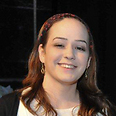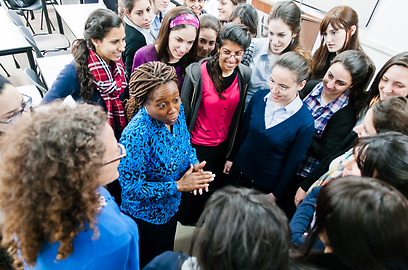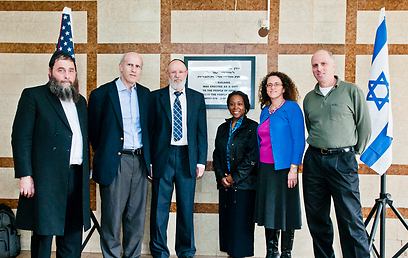
Equal share, haredi woman style
As part of efforts to help ultra-Orthodox women integrate into high-tech, US Embassy representatives meet with two female students who took part in development of advanced chip for American defense industry. 'They serve as an example for religious girls,' says cultural attaché
The Embassy's diplomatic attaché and cultural attaché made their way to the Lustig Institute in Ramat Gan to meet two of its graduates, Tehiya Dayan and Lior Halavi, after a small report about them on the Foreign Ministry website caught their eyes.
The Embassy staff, it turns out, has made its goal to assist in the integration of haredi women into the high-tech sector. The cultural attaché, Michele Dastin-van Rijn, told the students that the US government was interested in cooperating with the institute, as the students "serve as an example and role model for religious students," and promised "to work together to help them advance."

Dr. Ayanna Howard with haredi students (Photo: Tony Farkash)
Rabbi Zvi Ilani, director of the Lustig Institute which serves as the haredi academic institution for girls of the Jerusalem College of Technology's Machon Lev institute, noted that "Lustig girls' many developments for the country's biggest high-tech companies prompted the Embassy to initiate the meeting."
From seminar to space
Quietly and modestly, the veteran haredi seminar has been training haredi women for quite a few years now, granting them with academic degrees in the fields of high-tech, auditing and business administration.
This is the exact reason why Lior Halavi, 23, a young haredi woman whose parents are former seculars, chose to study there. Yet she never dreamed that her final paper for her bachelor's degree in programming would get her so far.

Haredi staff and American diplomats at Lustig Institute (Photo: Tony Farkash)
Halavi, who currently works in a high-tech company, cannot say much about the circumstances which led to the development of the chip or about who will be using it.
"All I can say is that it's for a defense industry. We didn't know much about what it was supposed to do either, as we naturally received very specific and focused data," she explains.
As part of the two students' work with the Verisense company, they were required to develop a code that would simulate the activity of the chip, which would eventually be installed in a space vehicle, and ensure that it properly communicates with its surroundings.
"It's a very expensive development," explains Halavi. "Producing the chip and then discovering that it has problems would cause serious damage. Our development saved a lot of money."
Outside incubator
As opposed to Halavi, who has left her "security-related chapter" behind since developing the chip, 21-year-old Tehiya Dayan found herself returning for another run. After taking a short break to work on medical equipment for breast cancer diagnosis, she went back to develop chips for the defense industry.
Dayan, who is married and has a child, lives in the northern haredi community of Rechasim. The long way she made from the local Beit Yaakov high-school to the defense industry is a very unusual sight in the local landscape.
"I really don't understand what the fuss is all about," she says modestly. "I am very happy with what we did. I also received many warm regards from residents who are very proud of us. Naturally, there are also those who are not.
"There is now a very strong trend of haredi girls integrating into high-tech. Personally, I am rather exceptional because I went to study it academically, and in Lustig of all places, which is considered modern compared to the background I come from. And yet, it is definitely unacceptable working in a clear secular or security-related environment."
So what is acceptable?
"What they call a 'technological incubator' – a group of girls working together in one place, so that none of them is really alone. They usually have different working hours, and their vacations match the Jewish calendar," she says. "But the disadvantage is the salary – one fewer zero in the paycheck. And in fields like space, there's definitely nothing to talk about."
But Dayan doesn't regret her choice. "I am alone in this definition, it's true. A haredi woman in a place which hardly even has any religious people. people don't understand why I won't shake their hand, compliment my hair without knowing that it's actually a wig. But they are charming and warm people, and it's a process of mutual adaptation. I get to know them and they get to know me."
Another development on the way
Dayan's impressive output – only 21, married, a new mother, a programming teacher with "rich security-related experience" – has become the joke of the office, she says. "My boss has a habit of introducing me at meetings, elaborating on my background, and then surprising people with my age. 'Look how old she is and how much she's already done. What about you?' It's become an internal joke."
Can you talk about what you're working on now?
"In general, on a similar field. Now I'm also working on a chip which is meant to be installed on space. Such chips, which cannot be examined and repaired if needed, have to be very simple, because complex planning may lead to complicated problems, and when the tool is in the air it's impossible to fix it.
"At the end of the day," she says, "I don't really know what I've done. It's not a mammography device which you know helped save women from cancer. Here you'll never know."
Dayan and Halavi are not alone. Another graduate of the Lustig Institute, Hadas Tischler, has gained international recognition for a study of computer integration in brain research. Another graduate, Efrat Hoffman, presented a unique development in the field of information systems for insurance companies.










